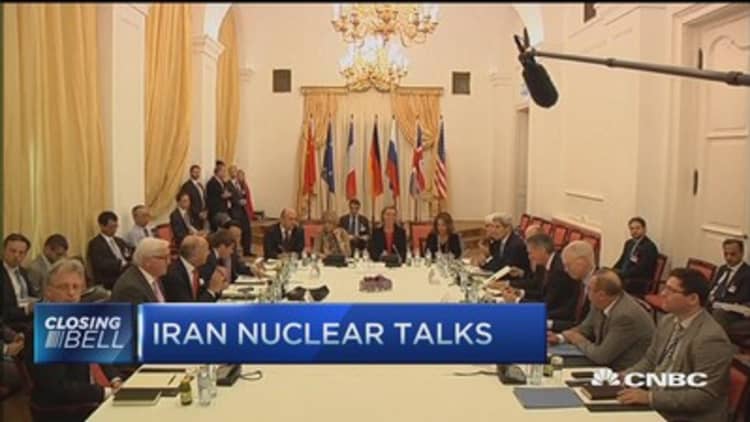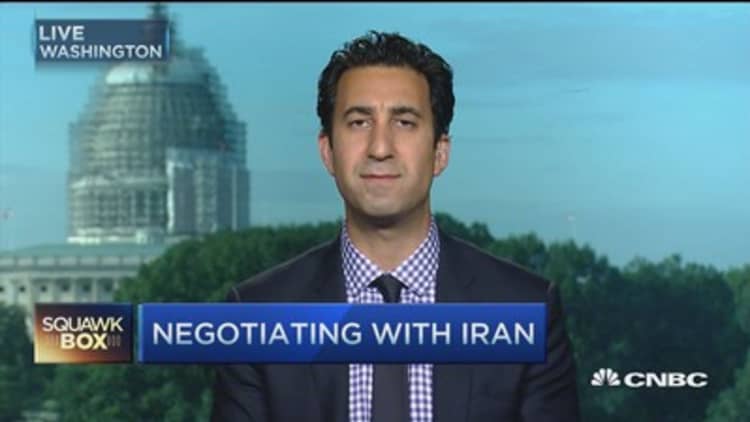
An Iran nuclear deal could mean a new arms race in the Middle East—or improved relations between historic enemies, experts told CNBC.
"To some extent, [a Middle East arms race] is already happening. And it's not just because of an Iranian nuclear program or a deal, it's the threat perception—the perception that Iran is ascendant in the Middle East," said Alireza Nader, senior international policy analyst at the Rand Corp.
Iran, the U.S. and five other countries are in Vienna working on a deal that would impose a freeze on Iran's nuclear weapons research for the next 10 to 15 years, in exchange for the lifting of economic sanctions. But Tehran's demand that an arms embargo also be lifted is complicating the talks. (Tweet This)
Some worry that an Iran freed from crippling economic sanctions and the arms embargo could result in greater assertiveness from the Islamic State group. Predominantly Shiite Iran already supports armed groups against its Sunni foe in Iraq, Lebanon and Syria.
Read More We'd have to defend against a nuclear Iran: Official
"There's going to be a lot of interest not just by Saudi Arabia and Israel, but especially by all the Gulf countries, to invest in defensive capabilities," said Blaise Misztal, director of the national security program at the Bipartisan Policy Center. The United States will see a lot of pressure to increase the quantity and quality of arms that it supplies to Saudi Arabia and Israel, he added.
Those two countries acquire most of their advanced weaponry from U.S. manufacturers. A number of U.S. defense manufacturers reached by CNBC either declined to comment or deferred their responses to the Department of Defense.
A concern among political analysts is whether, and by how much, Iran might increase its aid to proxy groups like Hezbollah and Hamas.
"Iran might increases spending to those groups, but I don't think that's reason enough not to make a nuclear deal," said Nader.

Other Middle East watchers, however, said a deal could improve historically negative relationships in the region as Iran engages in trade with its neighbors.
While Iran's trade partnerships have been shifting toward Asia in light of Western sanctions, a nuclear deal could boost its trade relationship with the West, an official with the World Bank told CNBC.
"If there's no sanctions, there's no reason why the members of the EU would not buy Iranian oil," said Shantayanan Devarajan, chief economist of the World Bank's Middle East and North Africa region.
Read More Kerry: Progress in Iran nuke talks, but no deal
A deal could open the door for the new Iranian government to change the country's relationships within the Middle East "that in the long term, may bear much economic fruit," said professor of history at the CUNY Graduate Center Simon Davis.
Specifically, the United Arab Emirates could re-establish itself as a major trading hub with Iran—a status it held prior to sanctions. Turkey could see an increase in trade with Iran, since Turkey has little oil. The two countries share a border.
But before any economic benefits accrue, countries in the region have to overcome long-running mistrust of Iran.
"Much like Saudi Arabia, I think the UAE is more scared of an emboldened Iran seeking regional hegemony than it is starting new business with them," said Misztal.
One thing you can count on
One thing is for certain—an Iran nuclear deal that lifts economic sanctions would affect the global price of oil.
The World Bank ran a simulation on the impact of lifting Iran's economic sanctions and found that it would bring to the world market 1 million additional barrels of oil each day, likely depressing prices.
"Just the pure effect of an addition of 1 million extra barrels of oil a day in exports from Iran would have the effect of bringing down oil prices over a two year span by about 14 percent, or roughly $10 a barrel," assuming that other oil producers don't cut back their oil exports to prevent prices from falling, Devarajan said.
Read More Oil traders await outcome of Iran nuclear talks
The World Bank expects to see an increase in foreign direct investment from multinational corporations into Iran that could reach $3 billion, according to Devarajan. That would be double what foreign direct investment was during the sanctions period of 2012 through 2014.


